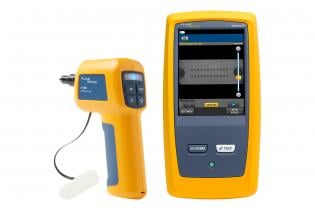Why Optical Fiber Testing Devices Is Vital for Network Maintenance
In the realm of network upkeep, the relevance of optical fiber testing equipment can not be overemphasized. These sophisticated devices play an essential role in recognizing mistakes and efficiency issues that could undermine the stability of information transmission. By using devices such as Optical Time Domain Reflectometers and Optical Power Meters, network experts can make certain compliance with sector standards while proactively attending to potential disruptions. As the need for trustworthy connectivity remains to rise, understanding the details of these screening methods comes to be necessary for preserving an effective network framework. What effects does this have for future network developments?
Significance of Regular Checking
In the realm of telecommunications, the importance of normal testing of optical fibre can not be overemphasized. Optical fiber networks act as the backbone of contemporary interaction systems, facilitating high-speed data transmission over substantial distances. Routine testing makes sure the integrity and reliability of these networks, discovering potential problems prior to they escalate right into considerable troubles.
Examining helps recognize faults, such as breaks or bends in the fiber, which can result in raised signal loss and compromised efficiency. Anomalies in transmission can deteriorate user experience, resulting in slow down information prices and service disruptions. Through methodical screening, network drivers can keep optimal efficiency, making sure very little downtime and maximizing service schedule.
It provides recorded proof of network health, which is important for audits and assessments. In final thought, routine optical fibre screening is essential for preserving the functional efficiency, safety and security, and long life of telecoms infrastructure, eventually making sure a seamless communication experience for users.
Trick Kinds Of Screening Equipment

One more critical device is the Optical Power Meter, used to determine the power levels of optical signals in the fibre. When coupled with a source of light, it makes it possible for the evaluation of link loss, making certain that the network operates within specified parameters.
Furthermore, a Fiber Identifier is important for recognizing certain fibers in a multi-fibre cable without interrupting solution. This tool assists in maintenance tasks by pinpointing the proper fibre for screening or repair service.
Lastly, Visual Fault Locators (VFL) are employed to discover breaks and mistakes in fiber cords by producing a visible light. With each other, these screening tools form an essential toolkit for preserving and troubleshooting optical fibre networks, guaranteeing trusted efficiency and decreasing downtime.
Troubleshooting Common Issues
When repairing usual problems in optical fibre networks, service technicians often come across a series of troubles that can influence efficiency and connectivity. One common problem is signal loss, which may originate from factors such as inappropriate splicing, bends in the fiber, or filthy ports. Using an Optical Time Domain Reflectometer (OTDR) enables service technicians to identify the specific area of faults and examine the integrity of the fiber optic cable television.
One more usual problem is attenuation, which refers to the reduction of signal stamina over range. This can arise from excessive bends or inappropriate setup strategies. Routine screening with power meters and lights can aid identify excessive attenuation and figure out i was reading this if the installment adheres to industry standards.

Enhancing Network Efficiency
Resolving common concerns such as signal loss and attenuation establishes the foundation for improving network performance in optical fiber systems. By employing sophisticated optical fibre testing tools, network managers can determine and fix faults that jeopardize signal integrity. This proactive technique not only prevents degradation of service yet also enhances the general performance of the network.
Routine testing permits the discovery of possible concerns before they escalate, ensuring marginal disturbance to individuals (optical fibre diameter analyser). By measuring parameters such as insertion loss, return loss, and optical power degrees, professionals can gain important understandings right into the health of the fiber network. This data-driven technique makes it possible for targeted maintenance strategies, facilitating quicker fixings and lowering downtime
In addition, keeping optimal performance levels is critical for supporting the raising needs of modern applications, such as high-def video streaming and cloud computing. Improved network performance equates to improved user experience, faster information transmission, and greater reliability.
Cost-Effectiveness of Upkeep
Purchasing optical fibre testing tools repays significantly in terms of upkeep expenses. By utilizing innovative testing tools, network drivers can proactively identify faults and concerns within the fibre optic facilities. This very early recognition his explanation minimizes the danger of catastrophic failures that could cause extensive downtime and costly fixings.
In addition, the ability to promptly analyze the problem of fiber wires permits for much more efficient allotment of maintenance sources. Service technicians can focus their initiatives on areas that need immediate focus, instead of carrying out wide, taxing assessments that may not generate important understandings. This targeted method not just reduces labour prices but also boosts the overall performance of maintenance approaches.
Additionally, regular screening with optical fiber equipment boosts the lifespan of the network facilities. try this out By dealing with small issues prior to they escalate, operators can avoid the considerable expenditures related to major fixings or replacements. The long-lasting economic benefits of buying these screening tools far outweigh the preliminary expenses, placing organisations to maintain optimal network performance while managing expense. In recap, the cost-effectiveness of upkeep is dramatically boosted through the strategic use optical fibre testing equipment, eventually leading to a durable and dependable network.
Conclusion
In final thought, optical fibre screening equipment plays an important role in maintaining network integrity and efficiency. Normal screening is essential for early mistake discovery and efficient troubleshooting, inevitably boosting network dependability.